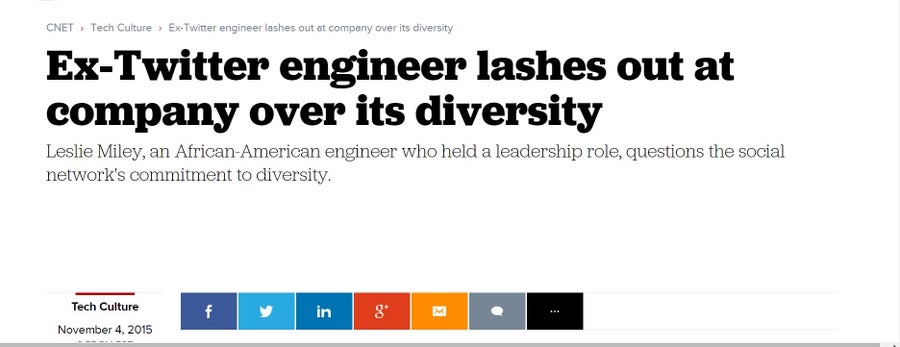This article was published in Scientific American’s former blog network and reflects the views of the author, not necessarily those of Scientific American
This is happening now on Twitter (afternoon, Friday, November 6, 2015).
Only a few hours to get your questions in for @deray! We want to know: who's your favorite follow? #AskDeRay https://t.co/QvCClxP8pM
— blackbirds (@blackbirds) November 6, 2015But two days ago (Wednesday, November 4, 2015) this was happening.
On supporting science journalism
If you're enjoying this article, consider supporting our award-winning journalism by subscribing. By purchasing a subscription you are helping to ensure the future of impactful stories about the discoveries and ideas shaping our world today.

I’m not sure if the recent activity of @BlackBirds including #AskDeRay campaign is a response to the criticism Twitter (and the rest of the social media companies) is getting for their lack of diversity in their ranks. But it definitely paints contrasting pictures of Twitter and their interests and commitment to diversity and inclusion. I often wonder, when indiviuals leave and call out organizations for lack of diversity how do those ‘left behind” feel. Do they feel alienated or suddenly visible when they wanted to lie low? Are they now put on the spot to respond to the allegations or defend the organization?
Leslie Miley, an engineer formerly with Twitter has drawn a lot of attention to his former employer for their lack of diversity; he departed a few months ago. Mark S. Luckie left Twitter in May and by my observation it didn’t draw as much attention, although he levies very similar criticisms on the organization.
Contrast the critiques of Miley and Luckie against the growing attention Black Twitter is getting from everywhere plus the acknowledgement from Twitter that Black people Influence social media and the world heftily, and might stare at your screen with a tilted head. I know I am.
During one meeting that Miley highlighted, he said he asked about creating a diversity engineering position, and a senior vice president replied, "diversity is important, but we can't lower the bar."
This, it always comes down to this. The presumption that deliberately and intentionally considering and including people from long over-looked and stepped-over groups means that an organization is lowering its standards, inviting sub-par talent into the circle. This is absolutely laughable considering how hard so many of us in STEM (science, technology, engineering, mathematics) from under-represented groups work just to get to where we are. Working twice as hard for half of the consideration isn’t just an inside joke among African-, Latin-, and Native American STEM’rs, it’s preparation for the harsh reality of the “Real World” we are often served up from the time we enter secondary school advanced math and science course, to what should be the height of our achievements – gaining advanced degrees, faculty positions, or even competing for tenure and full professorship. The. BS. Never. Lets. Up.
In a recent conversation with my coach, she asked,
Do you want to work at a place that values Diversity or a place that values You?
I had to pause, because until that moment I hadn’t really disentangled those desires. I was jumping to the conclusion that a place that valued diversity and inclusion (and I mean REALLY valued it, not just Diversity Racket lip service) would most certainly value me, and what I brought to the table.
I am a scientist. I am a woman. I come from a blue collar family and I identify as working class. I am African-American. I also an activist – a scholar activist – to be exact. I didn’t embark on a Ph.D. to become a public scholar or an activist, but it has happened, mostly as a survival tactic. As Dr. Prescod-Weinstein explains, I have become this
saltyperson because I had to, in order to stake and KEEP my place in science and wedge a sliver of daylight so that other women of color and first generation college students can participate.
I want to be in a place that values both – Both Diversity as a general principle and Me as a professional who brings many, many things to the table. I imagine that is what Miley was referring to in his critiques. We want to belong to teams that treat us as if we are truly and fully welcomed into the culture, not as special mascots to parade around and congratulate themselves when they “include us”. We want to be some place where no one immediately assumes that cultivating diversity is lowering the bar or a place that regards our membership/employment as charity.
I want a work place that values me, Me in all of my complexity, and identities. I want to be my whole integrated self. I want a work place that values everyone being their whole integrated selves.
Is that Twitter? Is that STEM in general? I doubt the answer is yes for the first and I know the answer is no for the second….but I’m willing to cherry-pick for my own sanity these days.